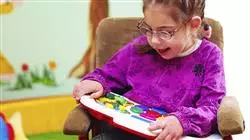University certificate
The world's largest faculty of psychology”
Introduction to the Program
Thanks to this Postgraduate certificate, you will learn about psychoeducational care in the hospital context"

Studies in psychopedagogy are in constant evolution due to the incorporation of technologies in the educational field. This discipline focuses on learning processes, their implications and behaviors and is increasingly in demand by educational centers. Given the lack of professionals specifically dedicated to this field, TECH has designed a program that covers multidisciplinary intervention and educational needs arising from visual, hearing or motor impairment, among others.
The psychoeducational team must be able to deal with problems associated with reading, writing and mathematics learning disorders, adapting to the heterogeneous environment latent in schools. This is the reason why TECH offers a complete and rigorous program aimed at graduates in Psychology who wish to specialize in the field of learning difficulties and developmental disorders, in order to promote the rehabilitation of those affected in the classroom. This instruction is possible through a 100% online modality, which has the support of a teaching team versed in the field of psychology and education in order to ensure proper theoretical and practical education of students.
In addition, the Postgraduate certificate has a theoretical-practical approach, which will introduce specialists to learning difficulties caused by socio-cultural and behavioral disorders. In addition, this program is highly dynamic, thanks to TECH's Relearning methodology. A method that allows the professional to advance progressively, while reducing the long hours of study so frequent in other orthodox teaching methods.
Enjoy a program that is based on the experience of its teachers and adapts to you so that you can follow it from anywhere"
This Postgraduate certificate in Differential Diagnosis and Multidisciplinary Approach to LD contains the most complete and up-to-date program on the market. The most important features include:
- The development of case studies presented by experts in psychology and education
- The graphic, schematic, and practical contents with which they are created, provide scientific and practical information on the disciplines that are essential for professional practice
- Practical exercises where self-assessment can be used to improve learning
- Its special emphasis on innovative methodologies
- Theoretical lessons, questions to the expert, debate forums on controversial topics, and individual reflection assignments
- Content that is accessible from any fixed or portable device with an Internet connection
Gain knowledge about the characteristics and consequences of having a visual or hearing impairment for learning"
It includes in its teaching staff professionals belonging to the field of psychology and teaching, who bring to this program the experience of their work, in addition to recognized specialists from reference societies and prestigious universities.
The multimedia content, developed with the latest educational technology, will provide the professional with situated and contextual learning, i.e., a simulated environment that will provide an immersive learning experience designed to prepare for real-life situations.
The design of this program focuses on Problem-Based Learning, by means of which the psychology professional must try to solve the different professional practice situations that arise. For this purpose, the specialist will be assisted by an innovative interactive video system developed by renowned and experienced experts in the field of learning psychology.
Be part of the current guidance teams in educational centers to detect disorders associated with AD"

Discover now the integration agents and complete your development as a psychoeducational professional"
Why study at TECH?
TECH is the world’s largest online university. With an impressive catalog of more than 14,000 university programs available in 11 languages, it is positioned as a leader in employability, with a 99% job placement rate. In addition, it relies on an enormous faculty of more than 6,000 professors of the highest international renown.

Study at the world's largest online university and guarantee your professional success. The future starts at TECH”
The world’s best online university according to FORBES
The prestigious Forbes magazine, specialized in business and finance, has highlighted TECH as “the world's best online university” This is what they have recently stated in an article in their digital edition in which they echo the success story of this institution, “thanks to the academic offer it provides, the selection of its teaching staff, and an innovative learning method aimed at educating the professionals of the future”
A revolutionary study method, a cutting-edge faculty and a practical focus: the key to TECH's success.
The most complete study plans on the university scene
TECH offers the most complete study plans on the university scene, with syllabuses that cover fundamental concepts and, at the same time, the main scientific advances in their specific scientific areas. In addition, these programs are continuously being updated to guarantee students the academic vanguard and the most in-demand professional skills. In this way, the university's qualifications provide its graduates with a significant advantage to propel their careers to success.
TECH offers the most comprehensive and intensive study plans on the current university scene.
A world-class teaching staff
TECH's teaching staff is made up of more than 6,000 professors with the highest international recognition. Professors, researchers and top executives of multinational companies, including Isaiah Covington, performance coach of the Boston Celtics; Magda Romanska, principal investigator at Harvard MetaLAB; Ignacio Wistumba, chairman of the department of translational molecular pathology at MD Anderson Cancer Center; and D.W. Pine, creative director of TIME magazine, among others.
Internationally renowned experts, specialized in different branches of Health, Technology, Communication and Business, form part of the TECH faculty.
A unique learning method
TECH is the first university to use Relearning in all its programs. It is the best online learning methodology, accredited with international teaching quality certifications, provided by prestigious educational agencies. In addition, this disruptive educational model is complemented with the “Case Method”, thereby setting up a unique online teaching strategy. Innovative teaching resources are also implemented, including detailed videos, infographics and interactive summaries.
TECH combines Relearning and the Case Method in all its university programs to guarantee excellent theoretical and practical learning, studying whenever and wherever you want.
The world's largest online university
TECH is the world’s largest online university. We are the largest educational institution, with the best and widest online educational catalog, one hundred percent online and covering the vast majority of areas of knowledge. We offer a large selection of our own degrees and accredited online undergraduate and postgraduate degrees. In total, more than 14,000 university degrees, in eleven different languages, make us the largest educational largest in the world.
TECH has the world's most extensive catalog of academic and official programs, available in more than 11 languages.
Google Premier Partner
The American technology giant has awarded TECH the Google Google Premier Partner badge. This award, which is only available to 3% of the world's companies, highlights the efficient, flexible and tailored experience that this university provides to students. The recognition as a Google Premier Partner not only accredits the maximum rigor, performance and investment in TECH's digital infrastructures, but also places this university as one of the world's leading technology companies.
Google has positioned TECH in the top 3% of the world's most important technology companies by awarding it its Google Premier Partner badge.
The official online university of the NBA
TECH is the official online university of the NBA. Thanks to our agreement with the biggest league in basketball, we offer our students exclusive university programs, as well as a wide variety of educational resources focused on the business of the league and other areas of the sports industry. Each program is made up of a uniquely designed syllabus and features exceptional guest hosts: professionals with a distinguished sports background who will offer their expertise on the most relevant topics.
TECH has been selected by the NBA, the world's top basketball league, as its official online university.
The top-rated university by its students
Students have positioned TECH as the world's top-rated university on the main review websites, with a highest rating of 4.9 out of 5, obtained from more than 1,000 reviews. These results consolidate TECH as the benchmark university institution at an international level, reflecting the excellence and positive impact of its educational model.” reflecting the excellence and positive impact of its educational model.”
TECH is the world’s top-rated university by its students.
Leaders in employability
TECH has managed to become the leading university in employability. 99% of its students obtain jobs in the academic field they have studied, within one year of completing any of the university's programs. A similar number achieve immediate career enhancement. All this thanks to a study methodology that bases its effectiveness on the acquisition of practical skills, which are absolutely necessary for professional development.
99% of TECH graduates find a job within a year of completing their studies.
Postgraduate Certificate in Differential Diagnosis and Multidisciplinary Approach to AD
TECH Global University will provide a comprehensive understanding of learning disorders, diagnostic methods, and multidisciplinary therapeutic approaches. Differential diagnosis refers to the systematic comparison of a person's symptoms with the symptoms of other conditions to arrive at an accurate diagnosis. It is used to rule out other pathologies that may present similar symptoms and thus be able to provide the patient with adequate treatment.
The multidisciplinary approach to LD (Learning Disabilities) implies a comprehensive approach in the treatment and management of learning disorders. Some professionals involved in this approach may include educational psychologists, speech and language therapists, educationalists, psychiatrists, neurologists, and social workers. They all work together to provide comprehensive, personalized care for each person affected.
Understand the different learning disabilities and the characteristics that distinguish them
The multidisciplinary approach involves long-term joint planning for treatment, continuous monitoring, and close coordination among professionals to ensure that treatment is effective and appropriate for each person's individual needs. For the differential diagnosis and the multidisciplinary approach to AD, other factors should be considered, such as family history, cognitive, social and emotional health, the results of evaluation tests and neurological indicators, and school history.
Our virtual academic Postgraduate Certificate on differential diagnosis and multidisciplinary approach to AD seeks to provide students with a solid understanding of different learning disabilities, diagnostic methods, and multidisciplinary therapeutic approaches to treatment. Sign up now, here we train experts with comprehensive approaches to the treatment and management of learning disorders DA (Learning Disabilities).







